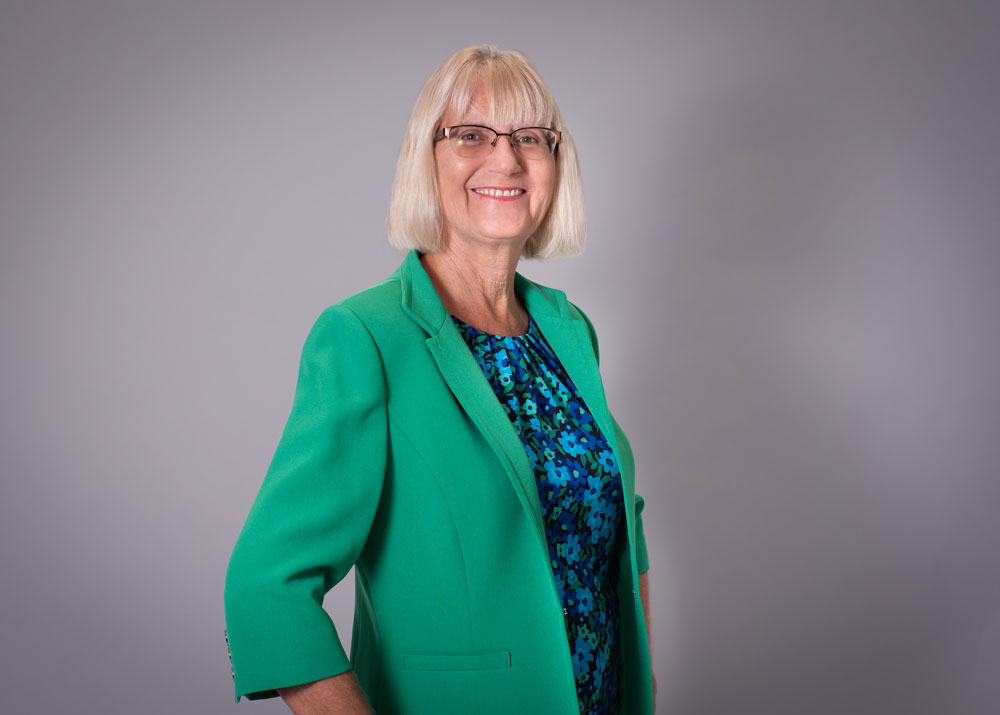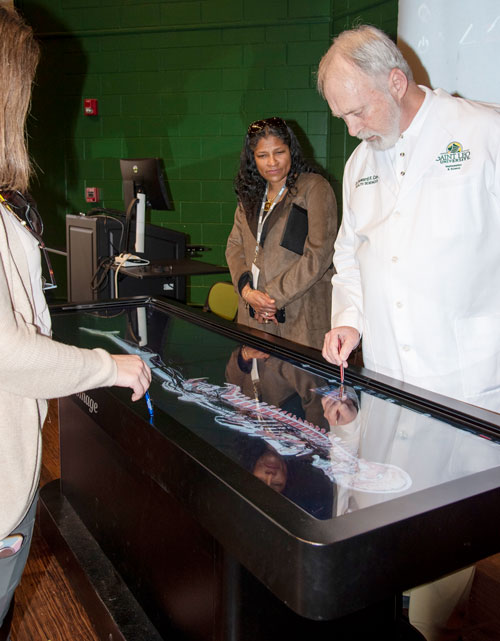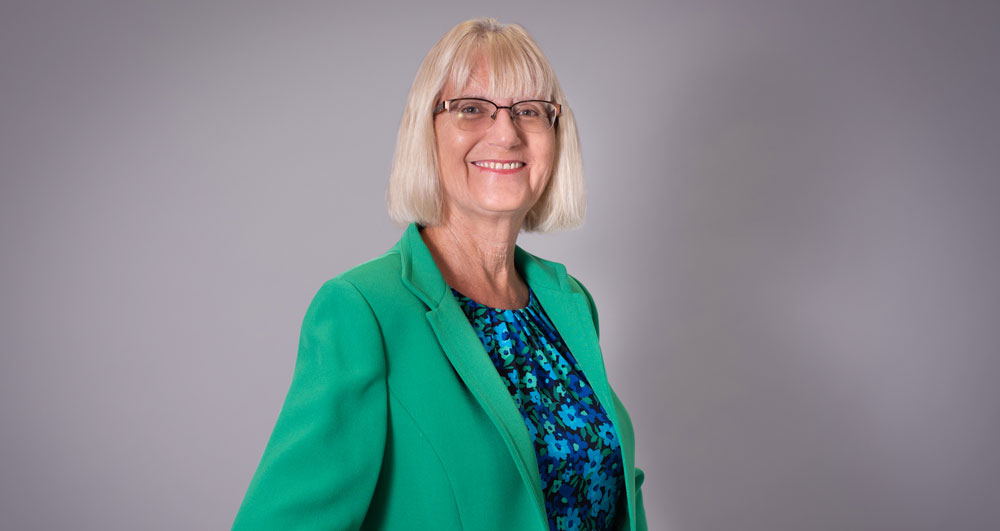 Since joining Saint Leo University a little more than two years ago, Dr. Kathleen Van Eerden, RN, has been busy helping the university create new academic programs to meet the fast-growing needs of the health care workforce both nationally and in Florida. The new programs all come under the new College of Health Professions, which joins the existing College of Arts and Sciences, College of Education and Social Services, and Tapia College of Business at Saint Leo.
Since joining Saint Leo University a little more than two years ago, Dr. Kathleen Van Eerden, RN, has been busy helping the university create new academic programs to meet the fast-growing needs of the health care workforce both nationally and in Florida. The new programs all come under the new College of Health Professions, which joins the existing College of Arts and Sciences, College of Education and Social Services, and Tapia College of Business at Saint Leo.
Dr. Van Eerden is the dean of the new college, and has been meeting with health care providers and community organizations that will likely hire Saint Leo graduates, in addition to developing the actual curricula for programs in nursing, health education, and respiratory therapy. She brings a wealth of experience to this important new venture, having previously served as associate dean of nursing and health sciences at Cardinal Stritch University, a Catholic institution in Milwaukee. She holds a PhD in higher education leadership in addition to her Master of Science and Bachelor of Science in nursing, and she is a Certified Nurse Educator.
Dr. Van Eerden explained in a broad-ranging, detailed interview Saint Leo's offerings in health care and their benefits to prospective students and community members.
Question: The College of Health Professions is the first new college (or school) that we have introduced at Saint Leo University in a very long time. Why don't you tell us about its mission.
Dean Van Eerden: It's a great fit for Saint Leo. It's very consistent with our core values that focus strongly on community, meeting the needs of the community in a compassionate and caring way.
Q: In your past experience, have you found that it is common for Catholic colleges and universities to offer some programs in their curricula devoted to heath or medicine?
Dean Van Eerden: Absolutely. It's very much consistent with the Catholic mission. That said, given the strong demand for health professions, we are seeing these programs across the country in public and private institutions. It's just that our focus is very strongly aligned with the Saint Leo Catholic Benedictine tradition, that strength and stability of community, and the focus on caring for one another and on offering hospitality. Those attributes are very consistent with health professions.
Q: The highest-profile major in the college right now is the Bachelor of Science in nursing to prepare graduates specifically to become registered nurses. Can you tell us the advantages of investing in a four-year degree to become an RN?
Dean Van Eerden: The four-year degree is a strongly encouraged route to go, and it has been for a number of years. Nationally, there has been a strong emphasis on professional nursing at the bachelor's degree level, and it's really encouraged as an entry-into-practice degree. It positions students for a number of job opportunities, since we're seeing that some employers are showing preference for those with a bachelor's degree. And it positions them for managerial positions and opportunities for their higher education if the student decides to go that route.
Employment outlook strong
Q: It will actually be a few years before we have Saint Leo nursing students in the marketplace; we understand that, because we're enrolling now for this new program. What do you think, based on your experience, will be the accomplishments of the program in 10 years? Will students, in five or six years, be working in hospital settings; will they be snapped up by the job market right away?
Dean Van Eerden: There's no question that the job market will be very open to our graduates—a variety of settings. Traditionally, you think of nurses in hospital-based settings; that's just one of many employment opportunities. The way our curriculum is structured, there is a strong emphasis on health as well as illness. As a result, students will have a range of experiences in the community, and they'll have exposure beyond the acute-care setting. So, it's likely that our graduates will be not only be in acute care, but in long-term care and senior living, community agencies, businesses, in school settings—just a range of potential opportunities.
The other thing that comes to mind for me is that we're thinking our graduates will still be in the profession in 10 years. You may or may not know that not all nurses stay in the profession, for different reasons. Knowing that, our curriculum has taken a strong emphasis on the well-being of nurses and nursing students. For example, our curriculum focuses heavily on building strength and resilience and stress-management skills, a variety of self-care skills. All of these, it is hoped, will not only facilitate a long, enjoyable career, but it will help nurses stay in the profession as well.
Q: How do you describe the difference between nursing and the other program that's at University Campus, the health education and health promotion program. Where do the two differ and what is the outcome in terms of jobs?
Dean Van Eerden: We do offer a Bachelor of Science in health education and health promotion. That degree is a perfect fit for students who are health-minded, but more interested in an education role, as opposed to a hands-on clinician role. In terms of similarities, it's that interest in health and well-being, and there is overlap between the two professions in the way in which they emphasize health teaching, and incorporate that into the role, as well.
 Q: Both the nursing and the health education and health promotion degree students will have chances, in their required anatomy and physiology classes, to see at least some lessons presented on the 3-D display table that we have at the university called an Anatomage® table. It has stored images—because it's also a computer—of things like the human musculoskeletal system, and other systems. What is the feedback on this?
Q: Both the nursing and the health education and health promotion degree students will have chances, in their required anatomy and physiology classes, to see at least some lessons presented on the 3-D display table that we have at the university called an Anatomage® table. It has stored images—because it's also a computer—of things like the human musculoskeletal system, and other systems. What is the feedback on this?
Dean Van Eerden: We know that anatomy and physiology knowledge and expertise is really important in any health profession in order to better understand body functions and physiology, and to help them understand variations from normal. The special table that we have at Saint Leo is like a giant computer monitor, the size of a real person. It gives students an opportunity to actually visualize different structures in the body and different functions in the body. There's literally the opportunity to adjust the piece of equipment as well, to just focus in on the circulatory system, respiratory system, reproductive system. This is so helpful for later, when as health care professionals the graduates will be educating people in their work in promoting health, and they will be drawing on this knowledge they have absorbed visually.
Q: In these two programs, how will students get practical, hands-on experience during their education?
Dean Van Eerden: In all of our health professions programs, there is a strong emphasis on experiential learning, through development of hands-on skills, and the development of different interventions. Experiential learning is built into courses. Our objective is to prepare students for the world of work and what they'll actually see once they complete their program and then begin their employment. Every effort is put forth to prepare students as strong practitioners.
We offer specific experiences in the workplace, whether it's aligning with an organization such as a health department for a student in health education and health promotion, to work alongside permanent staff in developing health instruction to meet a need the agency has identified. Or the various nursing clinical experiences that actually culminate in what we call a preceptorship, which is similar to an internship. The nursing student works alongside a registered nurse, works the nurse's work hours, and becomes completely immersed in the profession just before they graduate, so that they can then move directly into employment.
Online respiratory therapy program
Q: It's interesting too that another program that we're adding is an online program for working respiratory therapists who have associate degrees already, and who want to get the bachelor's degree. Can you explain a little more about these points: what respiratory therapists do; how their work has become so important during COVID; and how, during all this, it seems to have become more important for some therapists to move along with their training up from the associate-degree level?
Dean Van Eerden: Respiratory therapy is an absolutely essential profession. Respiratory therapists are strong members of an inter-professional team in health care that works with others to manage all aspects of the needs of that individual. Respiratory therapy assessments and interventions focus on meeting patients' basic airway and breathing needs, either working with equipment [which can include ventilators] and supplies designed to facilitate that, assessing the status of the individual, and focusing in on the education needs that the person might have.
Respiratory therapy education has traditionally been offered through an associate degree program. In recent years, the professional association has strongly advocated for a bachelor's degree for respiratory therapists to assure that they have an additional level of education, to assure that their position on the health care team is more comparable educationally to that of other members.
As a result of that recommendation by the national association, in recent years we've seen development of more bachelor's degree offerings in respiratory therapy. We know that there is demand for respiratory therapists with a bachelor's degree. They are more likely to be considered for managerial or director positions, for example. For those who personally aspire to further employment positions, or who aspire to more education for personal reasons, or for those who hope to consider their education beyond the bachelor's, we know that this degree is a good fit.
Our bachelor's degree program acknowledges and recognizes the coursework that's come before. Students have a strong base for their practice. They also come with significant experience in the role.
So, our Bachelor of Science in respiratory therapy degree focuses on courses that present different facets. For example, it not only extends respiratory therapy practice knowledge in pharmacology and pathophysiology [the study of ways the body can malfunction because of disease or illness], it also hones in specifically on topics more unique to a bachelor's degree—evidence-based practice, content on teaching theories and strategies.
And the third area of focus in our curriculum assists students in preparing for their role as a manager and leader, with content and courses on leadership development, managing a respiratory therapy program. There is an interesting course on project management to support health outcomes. And there is a capstone course that incorporates all of the prior learning, and that gives students an opportunity to integrate that.
Of course, the world of work for respiratory therapists in the last year or two has been very involved, given the work hours required with the pandemic. As a result, we positioned the program as an online program. It offers more flexibility to students. They will continue to work, likely, full-time. But they will be in a position to also be able to continue their education through an online modality.
Q: And because it's online, you can be anywhere in the country and enroll in this degree program, correct?
Dean Van Eerden: Absolutely. Students are able to enroll from across the country. Saint Leo is a member of an organization that allows for the university to offer our online programs in different states.
Q: Another point worth asking about is that you mentioned in the nursing program, for instance, there will be a strong emphasis on developing resilience, strength, and self-management. This seems to be part of a philosophy that runs throughout the College of Health Professions called the Culture of Health paradigm or philosophy. Can you speak just a little bit about what that is and how people who have been educated in the Culture of Health paradigm might have a slightly broader or different outlook than health professionals who have not been trained along those lines?
Dean Van Eerden: Culture of Health is a slightly different focus than we may see in some traditional programs. It looks at health across a continuum for individuals, families, and communities. There may be at a certain point on that continuum where there is a role for nurses, whether that person, group or community is well or ill. And the students will have experiences across that continuum, so they are in a position to promote health wherever that person or group may be.
Culture of Health is a more realistic look at the needs that people have. [The influential national health care philanthropy the Robert Wood Johnson Foundation is a leading source on the Culture of Health philosophy.]
In the past we may have focused on the needs in a hospital environment. Nowadays, a person may be in the hospital for two or three days. We want our students to look at not only what is needed in a hospital setting, but as people transition back into the community, into their homes, into other settings, how can we work with them to regain health, maintain health, or further seek healthy behaviors.
There are actually several topics that are integrated and emphasized across all of the programs in the Saint Leo University College of Health Professions. One is clearly the Culture of Health. The others are the well-being of the clinician or practitioner; inter-professional communication across health team members; and, of course evidence-based practice, or practice interventions based on research.
Q: For people who are interested in any of these programs, how do they find out more?
Dean Van Eerden: Admissions—(877) 622-2009—can help with pursuing enrollment. The website has very thorough information about each of the college's programs: admission requirements, detailed information about programs of study and courses with course descriptions. There is information about employment, potential income, and employment projections.

 Since joining Saint Leo University a little more than two years ago, Dr. Kathleen Van Eerden, RN, has been busy helping the university create new academic programs to meet the fast-growing needs of the health care workforce both nationally and in Florida. The new programs all come under the new College of Health Professions, which joins the existing College of Arts and Sciences, College of Education and Social Services, and Tapia College of Business at Saint Leo.
Since joining Saint Leo University a little more than two years ago, Dr. Kathleen Van Eerden, RN, has been busy helping the university create new academic programs to meet the fast-growing needs of the health care workforce both nationally and in Florida. The new programs all come under the new College of Health Professions, which joins the existing College of Arts and Sciences, College of Education and Social Services, and Tapia College of Business at Saint Leo. Q: Both the nursing and the health education and health promotion degree students will have chances, in their required anatomy and physiology classes, to see at least some lessons presented on the 3-D display table that we have at the university called an Anatomage® table. It has stored images—because it's also a computer—of things like the human musculoskeletal system, and other systems. What is the feedback on this?
Q: Both the nursing and the health education and health promotion degree students will have chances, in their required anatomy and physiology classes, to see at least some lessons presented on the 3-D display table that we have at the university called an Anatomage® table. It has stored images—because it's also a computer—of things like the human musculoskeletal system, and other systems. What is the feedback on this?